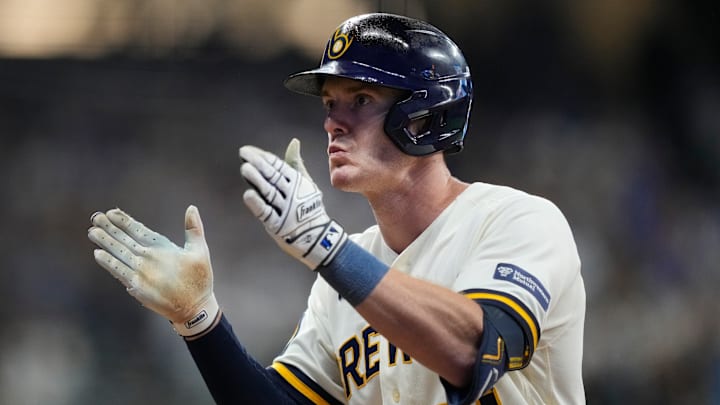The Milwaukee Brewers made waves today by trading away veteran outfielder/first baseman Mark Canha. The decision came right before the Monday deadline for the Brewers to make a call on Canha's hefty $11.5MM option for 2024. Surprisingly, they won't have to make that decision after all.
In his brief tenure with the Brewers, Canha exceeded expectations, slashing .287/.373/.427 with a .800 OPS over 50 games. This performance stands well above his career averages of .250/.349/.422 and .722 OPS. Canha's overperformance in Milwaukee raises substantial doubts about his ability to sustain such production in the upcoming season, especially considering he's entering his age 35 season.
The likelihood of regression, potentially below his career averages, was likely a significant factor in the Brewers' decision to trade him. General Manager Matt Arnold likely foresaw this potential dip in Canha's performance, providing a reasonable foundation for this unexpected trade.
In the broader financial landscape, the Brewers are juggling various priorities. Manager Craig Counsell, arguably the most successful manager in Brewers history, is exploring free agency, seeking a substantial increase in his salary. Counsell, a Wisconsin native deeply rooted in Brewers history, has produced winning records in six of his nine seasons as manager and is drawing considerable interest in free agency. It's now up to the Brewers to secure his return by matching the highest offer he receives.
The injury to star pitcher Brandon Woodruff for probably the entire 2024 season is another brutal blow to the Brewers. Woodruff, a key member of the team's dominant pitching staff, is not just an ace-quality arm but also a leader and the longest-tenured member of the team. This setback forces the Brewers to reassess their entire offseason strategy, especially considering the uncertainty around Corbin Burnes, who is entering his final year under contract. The pursuit of more pitching depth, as stated by GM Matt Arnold, now takes on added urgency.
The $11.5MM (or at least $2MM in terms of a buyout) saved from Canha's departure becomes a crucial asset that could be redirected to more impactful causes. This includes potential efforts to secure Counsell's return or finding a worthy replacement for Woodruff. As the Brewers face financial challenges and navigate unexpected hurdles, the focus is on ensuring that every dollar saved is strategically invested for maximum impact.
From an outfield perspective, the decision to part ways with Canha aligns with the team's depth in that position. The Brewers boast seven other outfielders on the 40-man roster, coupled with the anticipation of prospect Jackson Chourio's debut in 2024. This surplus in the outfield makes Canha's departure a strategic move, freeing up money and resources for more pressing needs (Woodruff & Counsell).
However, the trade leaves a void at the first base position for the upcoming season. With Canha and Carlos Santana no longer in the picture, options are limited to Rowdy Tellez and Owen Miller. Tellez's declining production raises concerns, prompting the Brewers to likely seek an upgrade in the coming months.
Instead of just declining Canha's option, the Brewers used him to acquire minor league hurler Blake Holub, a 25-year-old with promising potential. Holub, a 15th-round pick by Detroit in 2021, demonstrated significant improvement in 2023, reaching Double-A for the first time and showcasing impressive stats in relief appearances.
Overall, I cautiously grade this trade a B-. The emphasis on Canha's potential regression and surplus in the outfield makes it reasonable to trade him. The strategic use of the money saved is a crucial factor that could elevate or lower the grade as the offseason progresses.
While fans might express disappointment over Canha's departure, the trade makes sense given the considerations of the overall roster and the need to make strategic financial decisions for the upcoming season. As long as the money from Canha's deal goes somewhere beneficial, this trade is not one that will be frowned upon in the future.
